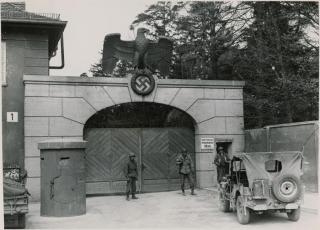Howard Melton, 85, of Glendale, is a Holocaust survivor.
He is driven to tell people his story. He has done so for school groups and newspapers. His video testimony is on file with the United States Holocaust Memorial Museum in Washington, D.C.
“I tell the stories because, what brought on the Holocaust? Hate, right?” Melton said. When he speaks he tells people: “Treat the other person the way you would like to be treated.”
“It makes me feel that I’m doing something,” he said, adding that he wants people to “behave a little better.”
Yom Hashoah, or Holocaust Remembrance Day, was marked locally with a May 1, 2016 ceremony (see Coming Events) and internationally on May 5, 2016. In honor of the day, we offer this lightly edited transcript of the Chronicle’s recent conversation with Melton.
Melton spent close to four years being shuttled among various camps and ghettos until, at the age of 14, he was marched out of Germany’s Dachau concentration camp as winter was giving way to spring in 1945.
Chronicle: Why don’t you tell me where you were walking from, on the march? Where did you start?
Melton: We started from Dachau. It was probably the end of April. We got there the night before. They gave us a shower. They told us to report the next day to the main gate. We reported to the main gate. They gave us a small loaf of bread and a small can of meat which I probably hadn’t seen in about maybe two or three years and they marched us out.
In the beginning we were marching in the daytime. There were I think probably about 2,000 (Jewish) prisoners and maybe 4 or 5,000 Russian prisoners. We were guarded by SS men with German shepherd dogs.
Chronicle: So you’re talking about when you first walked out or once the walk got going?
Melton: Quite a few … because it was long columns. 2,000 maybe Jews and maybe, what, 4, 5000 Russian prisoners. They were long columns.
Chronicle: So the SS men walked with the group on either side with the dogs.
Melton: Oh sure, yeah, yeah. The first couple days we walked in the daytime but then the American planes started strafing us because we were walking in long columns. They don’t know who we are. Then we started marching at night. No food, no water.
Chronicle: So the first couple days, what happened at night? Would they stop you at night?
Melton: It wasn’t a really good sleep but you fell asleep. What else are you going to do? So then we started marching at night.
One time we passed a field with, must have been some corn or something else, something edible. The prisoners started running into the field. The guards started shooting. I don’t know what that was, corn or wheat or whatever. I don’t know.
Chronicle: What did you see first? The prisoners or the field? What did you see?
Melton: We saw the prisoners running in the field. The guards started shooting them.
Chronicle: Did you think to yourself, what are (the prisoners) doing that for?
Melton: They haven’t eaten in about three, four days. They’ll die from bullets. They figure bang bang from a bullet is better than dying from hunger. It’s faster.
Chronicle: You think they knew they were going to be shot and it was just a way to end it?
Melton: Oh sure.Just a way to end it, yeah. Instead of jumping on an electric wire.
I have a friend here who is from the same hometown. We were in all the camps together. We were liberated together. He was just interviewed by a radio announcer. He name is Albert Beder.
Chronicle: So was he with you on the march?
Melton: Yeah, on the march. Actually,because of him I came to the States. We still see each other at least once a week. Our families are close together and our wives are close together and our children are close together.
Melton: I call him my older brother. He’s three years older than I am. He went to school with my older sister in my hometown.
Melton: We helped each other. You know, we were walking. He fell down a couple of times and I helped him up. I fell down a couple of times and he helped me up. We helped each other.
Finally, they marched us into some ravine with three little hills around it.
We saw the machine guns were in the hills. The Germans had told us, five minutes to 12 we’re going to get rid of you. We’re not going to leave you alive.
Melton: A ravine, it’s three hills, submachine guns. How many people? I don’t know, whatever there were, whatever were left. Hundreds, maybe a couple of thousand.
On the hills all the way around are machine guns. They told us, we’re not going to leave you alive. We knew, the Germans told us, before: We’re not going to keep you, we’re not going to leave you alive.
There were bad Nazis. There were some good Germans that helped us in a way. (The bad Nazis), they called us all different real bad names like piece of (expletive), you know.
But we woke up the next morning, evidently the commander of the transport wanted to save his own skin. He knew the war was over.
Melton: Oh sure. Yeah. I said goodbye to my friend. We said goodbye to each other. We said, oh maybe I’ll meet you in heaven or someplace. (Laughs) We didn’t know.
They didn’t shoot us. So they marched us starting again the next day. The Nazis made us go, I don’t know, another 30 or 40 kilometers.
We stopped for the night and woke up the next morning. We were covered in about two inches of snow. We were in the woods. We find out that the guards were gone. The dogs were gone. They all disappeared in the night.
Melton: They were all gone.Two old German soldiers, I don’t know where they came from. They marched us into this little village.
Melton: It was the end of the war. They drafted people in their 60s, already.
Melton: All gone.Marched us in this little village. And about 1 or 2 o’clock in the afternoon, the woods were kind of on a hill and we were down below a little bit and we saw some tanks coming down the hill with white stars. We didn’t know Americans used white stars. We didn’t know who they were.
The first tank that came into the hill, when it left it was very clean. People were crying and kissing it. It’s like getting your life back.
Melton: You can’t believe. A normal person couldn’t have such a feeling. It’s like you’re getting born again, you’re getting your life back. The mashiach (messiah) … it’s like he came and he brought you back from the dead. You know what I mean? You got your life back.
And the Americans were very good to us. They gave us c-rations, hamburgers, chocolate.
Melton: Oh, sure. The tanks and then trucks came down with soldiers, you know … you were in heaven.
Howard Melton is part of the Speakers Bureau of the Nathan and Esther Pelz Holocaust Education Resource Center, a program of Milwaukee Jewish Federation. For more information, visit HolocaustCenterMilwaukee.org.



